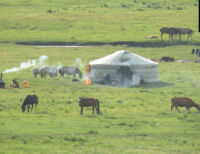In March 2021 a new sustainability course open to all students will be launched at the University of Helsinki. The three-credit course was designed in order to provide sustainability expertise to all University students by the time they graduate, regardless of the field of their degree.
“Many of our students are suffering from climate anxiety. They are clearly worried about the future and in need of support. We are obliged to organise this course for our students. Putting the knowledge obtained through the course into practice in their future jobs, they can eventually serve as forces for change,” Rector Sari Lindblom states.
In the course, the concept of sustainability is understood in a broad and multidisciplinary sense, as individual and societal wellbeing. In addition to natural and environmental sciences, the viewpoint of the humanities is needed to turn knowledge into action that promotes an ecologically, socially and economically sustainable world.
Inspiration was drawn from the sustainable development goals of the UN, which provide the titles for the course’s main themes. They pertain to climate change, natural systems, food, economy and urban areas. After a common introductory component, each student focuses on a theme of their choosing.
Lindblom is enthusiastic about the course, which has been under preparation for two and a half years. Originally, the idea was proposed at a rector’s campus visit by Hannele Cantell, university lecturer in education. As far as Lindblom knows, no similar courses are offered by other universities.
“This is one way for us to do our part in increasing understanding of sustainability as a multidisciplinary phenomenon.”
Article continues under the video.
Michiru Nagatsu introduces the sustainability course.
Discipline-specific further studies
At least to begin with, the three-credit course will be optional. In 2023 new degree requirements will come into effect, providing faculties and degree programmes with the opportunity to include the sustainability course in compulsory studies.
The goal is also to design additional field-specific courses worth two credits as a continuation of the course. Certain degree programmes already have suitable material available. These field-specific courses can be organised as either contact instruction or online.
The basic course common to all will be web-based, including the opportunity to complete it as an open MOOC in the future. Visual aspects and videos have been the focal point of the course design process.
“The course is designed for bachelor’s students, but it suits anyone interested in the topic,” says University Teacher Rami Ratvio, the course coordinator.
Course developed by a large group of people
The course is not the work of one small group. Instead, a total of 160 members of the University community contributed to its development: researchers and teachers from a range of fields, as well as some 20 students. Anyone interested in the project was welcome to join in the preparation work.
Although Ratvio was aware of the interest in sustainability issues, the number of participants came as a surprise to him.
“I’ve worked at the University for more than 20 years, and never before have I planned teaching with a group as broad and multidisciplinary as this. Everyone worked on the course alongside their duties, as a passion project.”
The sustainability pilot course is intended for University of Helsinki students only, but, later on, it will also be offered to University employees and in support of continuous learning outside the University. Already this spring, the course materials can be independently browsed on the University website.
The language of instruction in the pilot is both Finnish and English, but eventually separate versions in Finnish, Swedish and English will be made available.
Aiming to offer solutions
Ratvio says that planning the course was an eye-opening task for the participants. With philosophers, specialists in education, ecologists, legal scholars and researchers specialised in indigenous peoples, among others, participating in the working groups, everyone learnt something new from outside their own field.
“That increased my faith in grassroots cooperation. As a group, we were able to create a course which no individual teacher would have been able to produce on their own.”
Some challenges arose from the telecommunication recommendation introduced due to the coronavirus pandemic, and the groups had to rely on virtual platforms to think about learning outcomes and course content. Then again, researchers who were abroad were able to participate in remotely held workshops.
According to Ratvio, the course aims to offer solutions. It will explore different influencing tools, from legislation and funding to consumer decisions and activism.
“Personally, becoming aware of the multitude of levels where sustainability problems need to be solved has been illuminating. To make the transformation successful, different influencing techniques are needed.”
Ratvio hopes that the course will arouse people’s interest in sustainability and empower them. Based on a student survey conducted last spring, there is great demand for the course.
“We need people who will enable change: developers of technical solutions, designers and planners, legislators, people working in companies and municipal decision-makers. Organisations that highlight problems, households that make the decision to adopt a more sustainable lifestyle and citizens who vote for pro-environment candidates. Society as a whole must realise the need for change and act accordingly.”
















